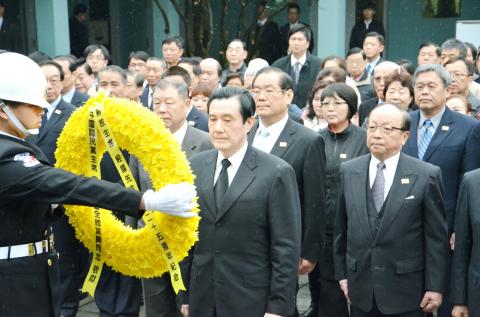President Ma Ying-jeou (馬英九) yesterday visited former president Chiang Ching-kuo’s (蔣經國) mausoleum in Touliao (頭寮), Taoyuan County, to commemorate the 25th anniversary of his death, remaining tight-lipped about the Democratic Progressive Party’s (DPP) rally against his administration.
The president arrived at the mausoleum at about 10am, leading top Chinese Nationalist Party (KMT) officials to pay homage and staying a while in front of the former president’s picture.
He shook hands with supporters on leaving the mausoleum, but did not comment when asked about the DPP’s “Fury” rally against the government.

Photo: Chiu Yi-tung, Taipei Times
As protesters took to the streets to express their anger at the government in Taipei, Ma was not scheduled to attend any other public events yesterday.
Presidential Office spokesman Fan Chiang Tai-chi (范姜泰基) said Ma went over government documents yesterday afternoon while monitoring the situation at the rally.
KMT spokesman Yin Wei (殷瑋) said the party’s Culture and Communication Committee was paying close attention to the rally and the responses to the event, dismissing concerns about the KMT’s attempt to downplay the protest.
The Ma administration has failed to give a positive response to three DPP demands: a Cabinet reshuffle, support of anti-media-monopoly acts and a national affairs conference.
While dismissing the DPP’s calls for a reshuffle and a national affairs conference, the government stressed its efforts to prevent media monopolization. This followed a move by a consortium — including pro-China Want Want China Times Group (旺旺中時集團) chairman Tsai Eng-meng (蔡衍明) — to acquire Next Media Group’s (壹傳媒集團) Taiwanese assets, which sparked debate about growing Chinese influence on Taiwanese media and the concentration of media ownership in the hands of conglomerates.
On Friday the KMT caucus backtracked on its previous support of the DPP’s proposed amendments to the Radio and Television Act (廣播電視法), the Satellite Broadcasting Act (衛星廣播電視法) and the Cable Television Act (有線電視法), arguing that a specific law regulating media ownership is needed.
Premier Sean Chen (陳沖) said yesterday during a visit to Nantou that the Cabinet had already declared its determination to prevent the monopolization of any businesses, including the media industry, and will support the National Communications Commission in drafting a specific law to address issues related to media ownership.
“The Executive Yuan was already working hard to revive the economy and address concerns about media monopolization before the DPP presented its demands at the rally,” he said.

INVESTIGATION: The case is the latest instance of a DPP figure being implicated in an espionage network accused of allegedly leaking information to Chinese intelligence Democratic Progressive Party (DPP) member Ho Jen-chieh (何仁傑) was detained and held incommunicado yesterday on suspicion of spying for China during his tenure as assistant to then-minister of foreign affairs Joseph Wu (吳釗燮). The Taipei District Prosecutors’ Office said Ho was implicated during its investigation into alleged spying activities by former Presidential Office consultant Wu Shang-yu (吳尚雨). Prosecutors said there is reason to believe Ho breached the National Security Act (國家安全法) by leaking classified Ministry of Foreign Affairs information to Chinese intelligence. Following interrogation, prosecutors petitioned the Taipei District Court to detain Ho, citing concerns over potential collusion or tampering of evidence. The

NEGOTIATIONS: Taiwan has good relations with Washington and the outlook for the negotiations looks promising, Minister of Economic Affairs J.W. Kuo said Taiwan’s GDP growth this year is expected to decrease by 0.43 to 1.61 percentage points due to the effects of US tariffs, National Development Council (NDC) Minister Paul Liu (劉鏡清) said at a meeting of the legislature’s Economics Committee in Taipei yesterday, citing a preliminary estimate by a private research institution. Taiwan’s economy would be significantly affected by the 32 percent “reciprocal” tariffs slapped by the US, which took effect yesterday, Liu said, adding that GDP growth could fall below 3 percent and potentially even dip below 2 percent to 1.53 percent this year. The council has commissioned another institution

NEGOTIATIONS: The US response to the countermeasures and plans Taiwan presented has been positive, including boosting procurement and investment, the president said Taiwan is included in the first group for trade negotiations with the US, President William Lai (賴清德) said yesterday, as he seeks to shield Taiwanese exporters from a 32 percent tariff. In Washington, US Trade Representative Jamieson Greer said in an interview on Fox News on Thursday that he would speak to his Taiwanese and Israeli counterparts yesterday about tariffs after holding a long discussion with the Vietnamese earlier. US President Donald Trump on Wednesday postponed punishing levies on multiple trade partners, including Taiwan, for three months after trillions of US dollars were wiped off global markets. He has maintained a 10 percent

TRADE: The premier pledged safeguards on ‘Made in Taiwan’ labeling, anti-dumping measures and stricter export controls to strengthen its position in trade talks Products labeled “made in Taiwan” must be genuinely made in Taiwan, Premier Cho Jung-tai (卓榮泰) said yesterday, vowing to enforce strict safeguards against “origin laundering” and initiate anti-dumping investigations to prevent China dumping its products in Taiwan. Cho made the remarks in a discussion session with representatives from industries in Kaohsiung. In response to the US government’s recent announcement of “reciprocal” tariffs on its trading partners, President William Lai (賴清德) and Cho last week began a series of consultations with industry leaders nationwide to gather feedback and address concerns. Taiwanese and US officials held a videoconference on Friday evening to discuss the